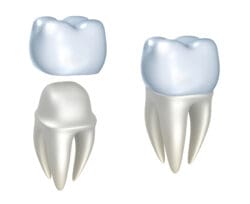A dental crown is a permanent restorative treatment that covers the tooth like a “cap” to provide protection and stability to teeth affected by damage or decay. Fully encasing a tooth, they essentially become the new outer layer and will sit just above the gum line.
At Infinity Dental of Fox Lake, Dr. Prendergast uses a variety of materials for dental crowns, but the most popular is a porcelain crown. Porcelain dental crowns are highly durable, stain-resistant, and very natural-looking.

Dental Crowns in Fox Lake, IL
Dentists use dental crowns to:
- Protect a tooth weakened by decay or damage
- Prevent chipped or broken teeth from breaking apart
- Restore teeth that are severely worn down
- Replace an existing restoration that covers more than half of the tooth
- Reinforce a tooth after root canal therapy
- Cover and support a tooth with a large dental filling when there isn’t enough remaining tooth structure
- Support a dental bridge
- Cover misshaped or severely discolored teeth
Dental crowns are also used in dental implants to restore beauty and function. While the dental implant serves as the replacement tooth root, the dental crown becomes the replacement tooth. Learn more about the benefits of dental implants.
Dr. Prendergast may also suggest using a dental crown for cosmetic purposes as well. With advances in dental technology, dental crowns look just like your natural teeth and will blend in with the rest of your smile. Since they encase the entire tooth, they have the ability to hide many cosmetic imperfections.
Process for Dental Crown in Fox Lake, IL
The process for dental crowns takes place in two-to-three office visits:
Examination: Dr. Prendergast will inspect your teeth and gums. After determining a crown is the best treatment option, he will inform you of the treatment plan, aimed at reaching both your health and cosmetic goals.
Preparation: The dentist will prepare the tooth for a crown by removing any old fillings or crowns, as well as the decay or damage. Using a dental drill, they will gently remove some of the outer surfaces of the tooth to create room for the crown. The dentist will then take an impression of the tooth as well as select a shade to match the natural teeth.
Temporary Crown: Typically, the dentist will place a temporary crown on the tooth while waiting on the permanent crown. Temporary crowns are usually made of resin and can be placed immediately to protect the tooth while the permanent one is being fabricated.
Final Crown: At your next appointment when the permanent crown has arrived, your dentist will remove the temporary crown and make sure your new crown fits properly. Once the dentist and the patient are happy with the fit, look, and position of the crown, it will be permanently bonded to the tooth and gently polished.
Dental Crown FAQs
Is it painful to have a crown put on your tooth?
No. The procedure includes a local anesthetic. The dentist will numb your mouth so that you do not feel pain during the process. Once the crown is in place and your mouth regains feeling, you should not be in pain. Contact us if you are in pain after a dental crown procedure.
How long do dental crowns last?
Dental crowns can last at least 15 years. Their lifetime can depend on the type of materials used (resin, porcelain, silver, gold) and your daily oral health routine.
What can you eat with a permanent crown?
You can eat as you would normally. There is no special diet or restrictions. Crowns are durable and act like natural teeth.
Can the dentist repair a chip in my tooth crown?
Depending on the severity of the chip, you may need a new crown. Schedule an in-person consultation with our dentist before making any assumptions.
Can you whiten a dental crown?
Your dentist is not able to whiten porcelain crowns with traditional teeth whitening treatments. They can stain over time. However, their level of staining is usually less significant than that of natural teeth.
Can you get a dental crown without a root canal?
A root canal is not required to receive a dental crown. Following root canal treatment, we may recommend dental crowns for patients with weakened teeth. However, this does not mean a root canal is required before a dental crown. Patients with damaged teeth who do not have dental infections can receive dental crowns. Patients with dental implants or dental bridges can also receive dental crown treatment.
Schedule a Dental Exam & Consultation
If you’re considering replacing old fillings or think you may need a dental crown to fix a tooth affected by decay or damage, call Infinity Dental of Fox Lake for a consultation.
